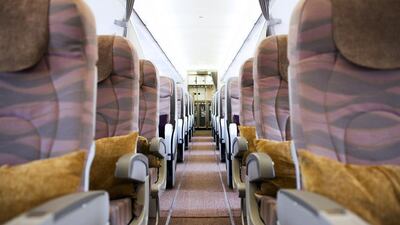Private charter operators in the region are looking to expand their fleet as they aim to cash in on the rebounding economy.
Niche players such as Falcon Aviation Services, Rotana Jet, Royal Jet and Qatar Executive, the Qatar Airways subsidiary, are exploring aircraft orders that could potentially be more than US$1.5 billion.
The Abu Dhabi-based Falcon also said yesterday that it would order two CSeries 300 aircraft from Bombardier worth $150m, giving a much needed boost to the Canadian manufacturer’s narrow-body jet.
"We are signing a firm order for two CSeries 300 corporate jets with Bombardier. This is going to be the first corporate CSeries 300 in the Middle East," said Mahmoud Ismael, the Falcon chief executive, at the Abu Dhabi Air Expo yesterday. "They represent a $150 million deal. This is a very big thing for us because we are changing slightly the beat by going with this aircraft rather than the traditional Airbus [or] Boeing."
Earlier this month, Falcon ordered two Q400 NextGen turboprop aircraft from Bombardier worth $61m, which are expected to be delivered as early as November.
In addition, Falcon is waiting for two helicopters that will be delivered in the first quarter of next year, which will take their overall fleet size to 28.
Royal Jet, also based in the capital, is set to place a $750m order to replace its existing fleet by 2020.
Shane O’Hare, the president and chief executive, said a decision should come by the second quarter. The potential replacements could include the Bombardier CSeries, the Boeing Business Jet line or the Airbus Corporate Jet. The first planes are expected to arrive in 2016, the company said.
“The current fleet is still young, but we need to work in advance as the interior is custom-built. We are also looking at various funding options,” Mr O’Hare said.
Another regional heavyweight, Qatar Executive, is also looking to bulk up its fleet.
“Qatar Executive is a very important part of our business,” said Akbar Al Baker, the chief executive of Qatar Airways, on the sidelines of the expo. “We are growing this business steadily. We started with just one aircraft a few years ago and now we have eight.” The carrier had ordered a Global 5000 jet from Bombardier and was considering additional purchases from the company, as well as from Gulfstream, he added.
It was not just the airlines that were upbeat about business prospects. The French manufacturer Dassault Aviation expects to grow its business in the Arabian Gulf as demand picks up for business jets.
The company last year sold nine of its Falcon business jets, including four of the long-range Falcon 7X, in the Middle East. The first of these orders will be delivered this year.
“The Dassault Falcon aircraft sales [this year] are expected to grow the overall Dassault Falcon regional fleet by a further 10 per cent, with the Falcon 7X and new Falcon 5X accounting for most of these new sales orders,” said Renaud Cloatre, the company’s sales director for the Middle East. “With the gradual recovery of the worldwide economy, [the Middle East] is once again showing signs of sustained growth.”
The number of business jets operating in the region will double by the end of the decade, according to the Dubai-based Middle East Business Aviation Association (Mebaa).
In the past five years, Dassault has delivered 30 Falcon aircraft in the region, Mr Cloatre said.
The Middle East and Africa region has a relatively small share in global business aviation market, accounting for 3 per cent to 4 per cent of the global total, with the average age of the business jets at 15 years, according to Mebaa. The market has grown by about 7 per cent each year over the past five years.
The Middle East is expected to contribute 4 per cent of the global demand for business jets over next five years, the group said.
business@thenational.ae
Follow us on Twitter @Ind_Insights

